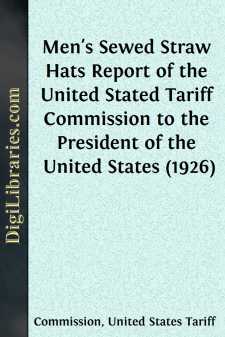Non-Classifiable
- Non-Classifiable 1768
Non-Classifiable Books
Sort by:
This is the old gentleman who used to walk in front of steam-driven carriages on the King's highway. He carried in his hand a red flag which he waved. This is the traction-engine which always came behind the old gentleman, and made such a dreadful noise. If the roads were good it could travel four miles in one hour. This is the old gentleman getting out of the way of a motor car. This is a Motor...
more...
RESIDENT PHYSICIAN. The Resident Physician, who shall also be the Superintendent, shall be the chief executive officer of the Asylum; he shall have the general superintendence of the buildings, grounds, and property, subject to the laws and regulations of the Trustees; he shall have the sole control and management of the patients; he shall ascertain their condition, daily prescribe their treatment, and...
more...
by:
Anonymous
THE FINDING OF JOHN EVELYN'S MS. DIARYAT WOTTON. The MS. Diary, or "Kalendarium," of the celebrated John Evelyn lay among the family papers at Wotton, in Surrey, from the period of his death, in 1706, until their rare interest and value were discovered in the following singular manner. The library at Wotton is rich in curious books, with notes in John Evelyn's handwriting, as well as...
more...
by:
Alexander Butler
CHAP. 1. Of the situation of the Towne ofKnaresborow. naresbrugh (commonly called Knaresborow) is a very ancient Market towne in the West-Riding of Yorkeshire, distant 14 miles from the City of Yorke; where the Pole is elevated 54 degrees, and 20 odde minutes. On the South-west part thereof is that faire, and goodly Fort, so much renowned, both for the pleasant situation, and remarkable strength,...
more...
Introductory Reference to files.—The basic documents in connection with the investigation on men's sewed straw hats are in the files of the Tariff Commission and are available to the President. They include the transcripts of the public hearings and the original cost schedules and other data. These include confidential data, the disclosure of which is forbidden by section 708 of the revenue act...
more...
INTRODUCTION Man's inclination to decorate his belongings has always been one of the earliest signs of civilisation. Art had its beginning in the lines indented in clay, perhaps, or hollowed in the wood of family utensils; after that came crude colouring and drawing. Among the first serious efforts to draw were the Egyptian square and pointed things, animals and men. The most that artists of that...
more...
CHAPTER I A Home in the Blest Land, by the Sacred Sea "Blest land of Judæa! Thrice hallowed in song,Where the holiest of memories pilgrim like throng,In the shade of thy palms, by the shores of thy sea,On the hills of the beauty, my heart is with thee."—Whittier. A Galilean boy, a fisherman, a follower of Jesus, one of the twelve Apostles, one of the favored three, the beloved one, the...
more...
Once upon a time, a thousand years before Columbus discovered America, and when Rome was still the greatest city in the world, there lived a brave and beautiful youth whose name was Arthur. His home was in England, near London; and he lived with the good knight Sir Hector, whom he always called father. They dwelt in a great square castle of gray stone, with a round tower at each corner. It was built...
more...
A REVIEW OF THIS WORK, Occupying nearly four columns, appeared in the New York Tribune of Dec. 30th, 1879, from which the following is extracted. "It embraces the time from the accession of Francis I. in 1515, to the death of Charles IX. in 1574, at which epoch the doctrines of the Reformation had become well-grounded in France, and the Huguenots had outgrown the feebleness of infancy and stood as...
more...
I have promised the children to write something for them about their favourite story-teller, Juliana Horatia Ewing, because I am sure they will like to read it. I well remember how eagerly I devoured the Life of my favourite author, Hans Christian Andersen; how anxious I was to send a subscription to the memorial statue of him, which was placed in the centre of the public Garden at Copenhagen, where...
more...











